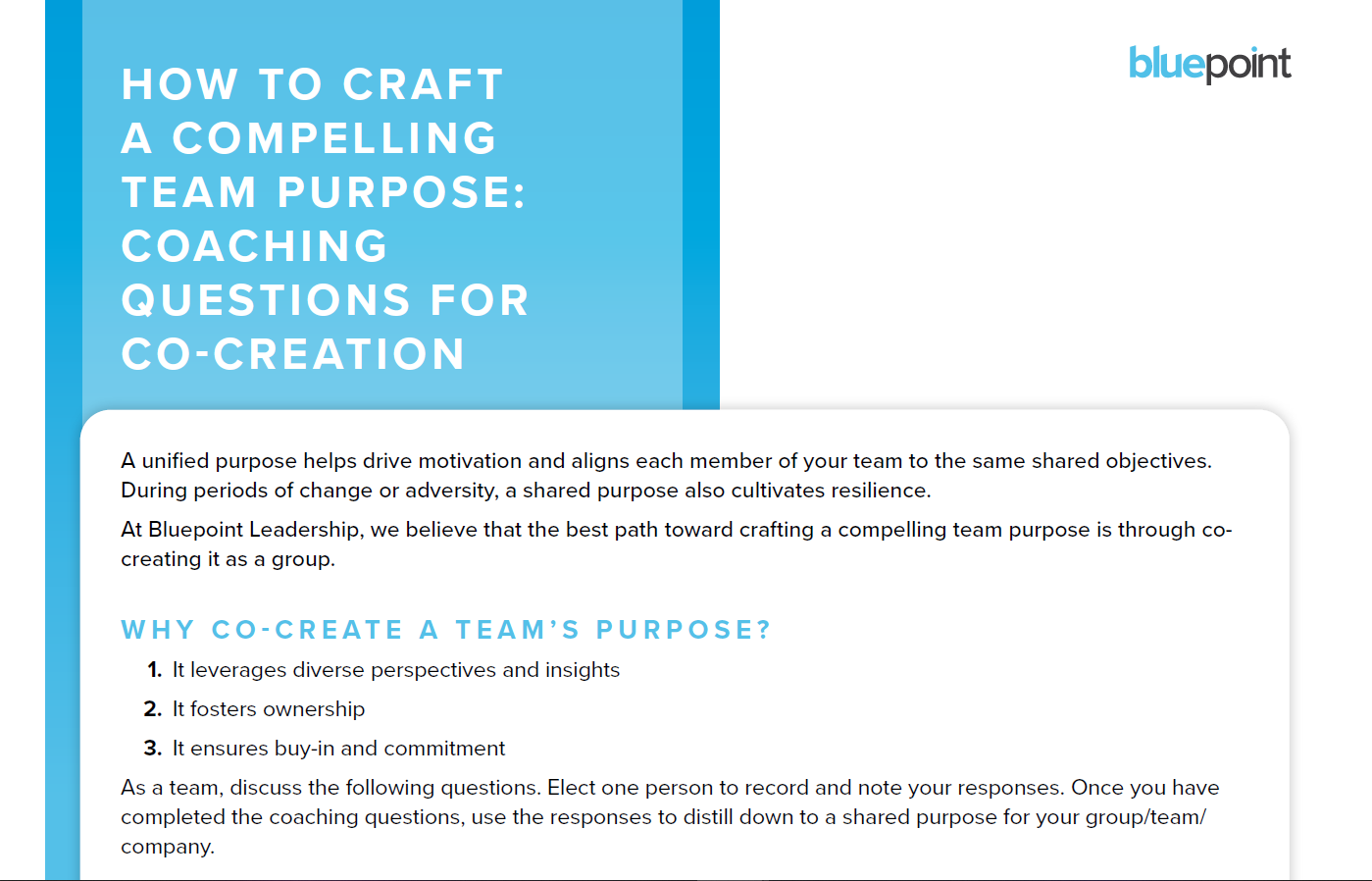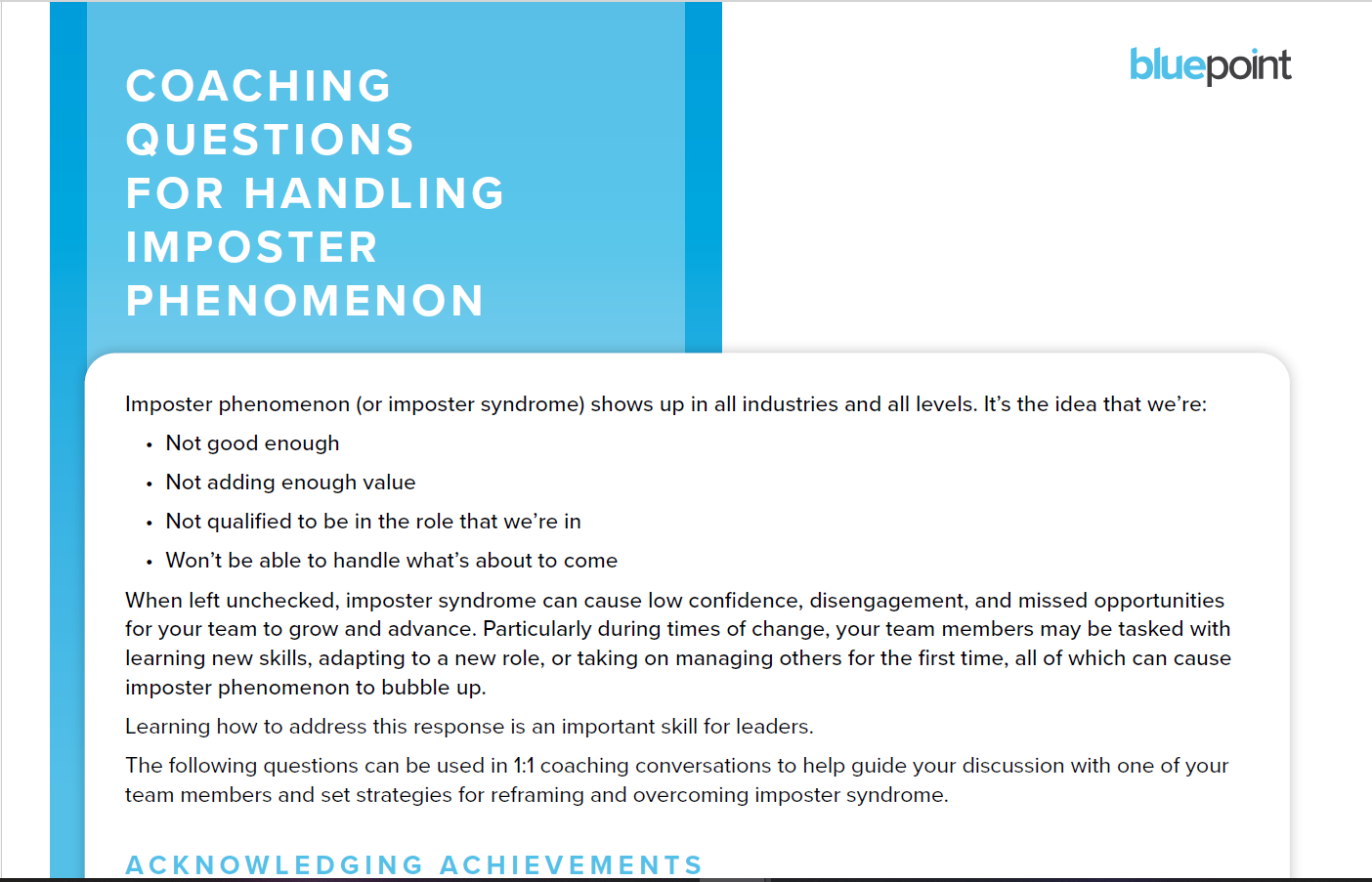How many people would willingly choose you as their coach? When you look at the people with whom you interact on a daily basis, how many attribute their success to your influence?
Earning the Right
As managers, we do not automatically assume the mantle of coach. Hiring, planning, performance management, and other such tasks naturally accompany the role of manager – but coaching does not. The title of Leader Coach is one we must earn.
It requires two choices:
- The first is our decision to invest our time and energy to help another create significant personal change
- the second is the choice this person makes to include us in their change efforts
Think back on your own career. Can you identify a person who saw talents and potential in you that no one else did? Someone who encouraged you to explore new possibilities? Someone who challenged you to a higher level of performance? A person who truly cared about your development and success, and invested those rarest of commodities – time and attention – in you? Who comes to mind? Now, consider the following questions: How did this person earn the right to coach you? Why did you invite this person into your life and listen to this person above others?
When I reflect on this question myself, I realize that the people from whom I have sought and continue to seek coaching have a strong values-orientation. They are clear about their personal values and live them consistently. First and foremost, they are authentic. My own great coaches also have a wonderful blend of humility and self confidence. They have a healthy level of self-esteem – one of the reasons they are able to engage with me authentically is that they do not need to work on their own ego issues at my expense. Finally, my best coaches enter into our relationship with noble intentions; they genuinely care about me and my success and will sacrifice some of their own needs so as to attend to mine.
So, how do you earn the right to coach others? You begin by becoming a coach to the most important person of all – yourself. It is only when you can effectively manage, motivate and coach yourself to higher levels of performance that you will know how to coach others. If leadership is about going first, then as a Leader Coach, you must first strive to live up to your own fullest potential.
You Must Change
I wish I could give you better news, but I cannot. Being a great coach is primarily about who you are in your relationships with other people. Think for a moment about your staff, co-workers, boss and customers. Think about your interactions with them, about your influence on them, and about the impact you have on their working lives.
- Are you important to them?
- Do they perform better because of their relationship with you?
- Would others call you a coach?
- Do people trust that you have their best interests at heart?
- Would others attribute their success to you?
Can you identify ways in which your impact on others needs to change? Now consider this: If you continue following the same course, you will get the same results – or lack of results – you are getting now. The key factor in your ability to coach others for higher performance is who you are with others. Therefore, the change must start with you.
Like it or not, as a manager, you are always on display. Your behavior is continually scrutinized. The impact of your actions is noted and magnified in the eyes of others. People watch you and form opinions about who you really are. They even make up stories about you when they do not have enough information to paint a complete picture. They’re not being intentionally judgmental; they are just fulfilling the human need to have a frame of reference when dealing with you. They ask themselves if you’re the kind of person they want poking around in some of the most sensitive and important areas of their performance and career. They ask themselves, “Do I respect him enough to believe that he has value to offer me in my role? Do I trust that she truly has my best interests at heart?” How you are evaluated in these assessments determines whether or not you will be invited to coach another.
Your Thoughts Matter
What thoughts do you think most often about those with whom you work? Take a moment to contemplate this question and be completely honest. Think about this: Many of your opinions are already being broadcast to those with whom you interact. We are actually quite transparent. Either overtly or covertly, you communicate these things before you’ve even spoken a word. People generally know what you think of them, and they respond accordingly. When you think of others as unmotivated, incompetent or unintelligent, they know it and will typically resent you for it. And, you will not be invited in as a coach. However, when you think of others as unique, talented and developing, regardless of their current level of performance, they will also know this, and will be much more likely to invite you to coach. More importantly, they will seek to live up to your assessment of them. By seeing people at their very best, you can set the stage for high performance.
You may have a desire to coach, but the decision is not yours alone. Coaching will not happen until you have earned the right in the eyes of another.
Questions to Consider
- Select five or six people with whom you interact on a regular basis. How do you think each of these people would rate you as a coach?
- What would it be like to work with or for someone like you? Would you feel valued, appreciated, talented and heard? Would you feel like an important part of the team?
- Is being in your presence a positive experience, or do you worry that people feel better when you are not there?
About The Author

Gregg Thompson
Gregg Thompson is a keynote speaker, author and executive leadership coach. As a much-in-demand speaker, Gregg leads his audiences on interactive, highly-engaging learning journeys that are both educational and entertaining. He dares audiences to abandon many of their closest-held beliefs about leadership and to explore new ways of seeing, relating to and influencing others. He confronts audiences with their own biases, judgments and attitudes, and challenges them to replace these with fresh new perspectives and practices. He vividly demonstrates how leaders can make a major shift in their personal impact and use their natural strengths to master the art of leadership. Gregg is the author of The Master Coach written for leaders who understand the impact of coaching on performance and career acceleration. The book is an invitation to leaders who want to make a significant shift in their attitudes, values and behaviors and become more coach-like in all of their daily interactions and conversations.
Related Resources
Subscribe to newsletter
Subscribe to our newsletter today and receive innovative, insightful and thought provoking resources (videos, webinars and articles) all effective tools for developing leadership talent.
Connect with Us Today!
This is a gated resource. Contact sales at info@bluepointleadership.com for more information or reach out here: Contact Us
This is a member-only resource. Contact sales at info@bluepointleadership.com for more information.





